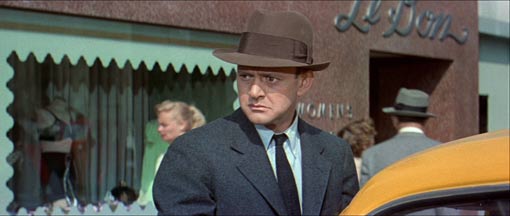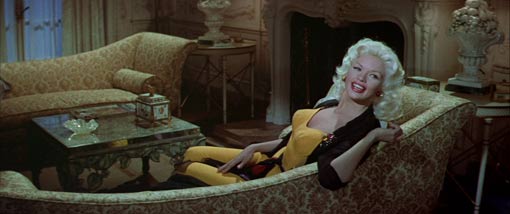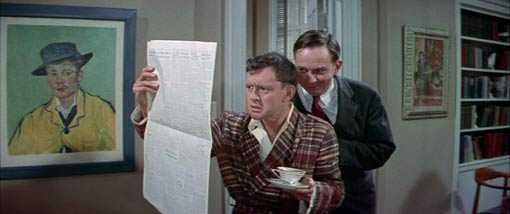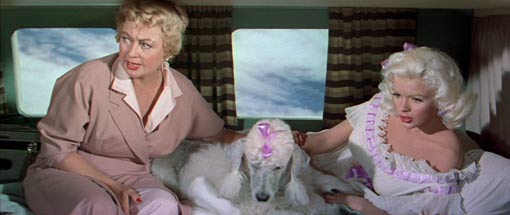| |
"We're not talking about talent! If talent had anything to do with success Brooks Brothers would go out of business. Television studios would be turned into supermarkets!" |
| |
Henry Rufus to Rockwell Hunter |
We tend to think of post-modernist referencing as a recent phenomenon, a product of what has been dubbed the MTV generation. I'm thinking here of those gags that are not gags in themselves and have precious little to do with the narrative of the film in which they occur, ones whose humour relies on nothing more than our shared recognition of what is being talked about, parodied or imitated. And it goes back further than you might think. Check out the delirious 1941 Olsen and Johnson comedy Hellzapoppin'. At one point Chic Johnson picks up a sled with the word 'Rosebud' written ornately on it and remarks, "I thought they burned that." Unless you've seen Citizen Kane, the line means nothing.
And then there are those films in which characters seem aware that they are in a film, breaking the fourth wall to comment on the narrative or converse directly with the audience. The latter has been part of theatre since its earliest days (the very idea that the fourth wall should be acknowledged at all apparently did not come about until the nineteenth century*) and both elements found an early cinematic home in comedy cinema – think of the way Oliver Hardy used to share his exasperation with us by looking directly at the camera, widening his eyes and sighing as if he expected us to respond in kind. Later feature comedies would uphold the tradition, as in the glorious moment in Blazing Saddles where an old woman is being beaten by a gang of thugs turns to the camera to ask, "Have you ever seen such cruelty?"

But the true masters of early fourth wall destruction were animators like Chuck Jones and his compatriots. In their short films, characters regularly engaged in conversation with the audience and, in extreme cases, even the animator himself. In the 1953 Duck Amuck, one of Jones's most surreal and thrillingly imaginative films, Daffy Duck is continually tormented by an initially unseen animator who repeatedly alters his location and physical appearance, prompting a series of loud protestations to camera. But that's the wonderful thing about cartoons, visually divorced from the real world as they are – once you've established your characters there really are no rules about what you can then do with them.
Jones, of course, worked for Warner Brothers, whose output during what proved to be the golden age of American animation** made it one of the most successful animation studios of all time. A number of talented animators established themselves in what became known as Termite Terrace, including Jones, Robert Clampett, Fritz Freling, Tex Avery, Arthur Davis and Robert McKimson. One of these good men eventually went on to write and direct live action features, but in doing so never forgot his background as an animator and the possibilities for envelope-pushing that the medium offered. His name was Frank Tashlin, and following the success of his energetic 1956 rock 'n' roll satire, The Girl Can't Help It, he was given the chance to adapt and direct a film version of George Axelrod's successful Broadway play Will Success Spoil Rock Hunter?. It's perhaps a sign of the esteem in which Tashlin was by then held that he was allowed to completely re-write the play for the screen, retaining little more than the title and one of the key characters, and then run with it. And boy did he run.
This is a film that lays its stylistic cards on the table in the opening frames during the usually unmolested studio logo, with the Twentieth Century-Fox drum roll and fanfare performed in the corner of the Cinemascope screen by the film's star Tony Randall, who then complains about the small print in his contract and introduces the film as The Girl Can't Help It, followed immediately by the realisation, "No, we made that." The opening credits that follow are accompanied by satirical TV commercials for a series of hopeless products, including head-free beer consisting mainly of foam, an easy-access fridge that cannot be opened, a shaver that becomes lost in a comically false beard, and a super-strong washing power whose secret ingredient is fallout. It's an inspired collection that sets the scene for what follows in more ways than one, but whose up-front placement apparently had more to do Tashlin's dislike of credits and desire to distract the audience from them.

Randall then introduces himself as Rockwell Hunter, a Madison Avenue-based writer of television commercials and the film's leading man. The company he works for, the tongue-twisting LaSalle Jr., Raskin, Pooley & Crocket, is struggling to come up with a dynamic new campaign for their most important client, Stay-Put Lipstick. At the start of the film proper, Hunter is called into the office of his immediate superior Henry Rufus (Henry Jones) and told that they may lose the Stay-Put account and that both of their jobs now hang in the balance. What sounds like a set-up for serious drama is in Tashlin's hands anything but. On Hunter's arrival, Rufus is wedged in an electrically powered rocker-recliner popping his fifth tranquilliser of the day, which he washes down with gin ("I also eat the olives – that's where the nutrients are"). His language is oddly peppered with baby talk like "foldy" (for "fold") and "numby-wumby" (tranquilliser), and he concludes that they'll easily get other "jobbies" elsewhere, or rather "I will anyway. I've got no talent." When Hunter performs his latest idea for a singing lipstick commercial, he is accompanied by an unseen band that grows more boisterous as he progresses and even provides a harmonica note for him to tune his voice to. The whole scene is a splendid but unforced blend of understated humour and cartoon exaggeration that sets the tone well for the lunacy tinged comedy-drama that follows.
Hunter, we are told, plans to marry office secretary Jenny (Betsy Drake) as soon as he can afford it, and for unspecified reasons has been charged with raising his teenage niece April (Lili Gentle), who has a fan girl's obsession with Hollywood movie star Rita Marlowe (Jayne Mansfield). When Marlowe flies to New York to teach her muscle-bound boyfriend Bobo (star of the first adult monkey series and amusingly played by Mickey Hargitay) a lesson and start her own production company, April sneaks out greet her at the airport. Although initially angered by April's disappearance, Hunter then takes inspiration from her infatuation with Marlowe and proposes that the company approach the star – the woman with the most kissable lips in Hollywood – to endorse Stay-Put lipstick. Despite a press blackout, April successfully discovers where she is staying and Hunter times his first visit perfectly, being invited in by Marlowe to talk to Bobo by phone and crank up his jealously. He soon then finds himself trapped in a fait accompli – Marlowe is willing to take part in the ad campaign, but only if Hunter will pose as her boyfriend, putting his relationship with Jenny in serious jeopardy.
It may sound like a standard studio romantic-comedy plot of the period, but as that opening scene suggests, it doesn't play out by the Hollywood book. Repeatedly bounced around by his double-edged fortune, Hunter is ticked off by company boss La Salle (John Williams) and departs in defiance, only to then be re-hired and promoted (the key to the executive washroom is presented as a sort of professional Holy Grail, its acquisition accompanied by a heavenly choir and tears of joy), all the while performing a juggling act that keeps the increasingly infatuated Marlowe at emotional arm's length in a relationship that manages to delight his niece and infuriate Jenny. He's even dubbed "Lover Doll" by the enthusiastic press, and in one of the film's funniest cartoon influenced scenes, is energetically pursued by hoards of adoring women. Even the female employees at his firm become star-struck. "Can I have your autograph?" asks one girl fawningly, adding after a beat, "On my blouse."

As the consistently flustered Hunter, Tony Randall is sublime casting, his confident bluff repeatedly crumbling to reveal a man of fragile self-confidence who is unable to differentiate between what he really wants from life and what chance lands in his lap, convinced that his business success will help his relationship with a woman that he fails to realise he is driving away. Having also played her in Axelrod's stage production, Jayne Mansfield wears the character of Rita Marlowe like a sequined glove, a sometimes hilarious and only slightly outlandish parody of Marilyn Monroe, her chirpy delivery punctuated with high-pitched squeals, a frothily superficial surface that is intermittently rolled back to reveal a pragmatic if still ditzy businesswoman in full control of her own image. A splendid supporting cast are all in on the gag, particularly Henry Jones as Rufus, whose chemical-assisted eccentricity transforms half of his lines into small comic gems. And though she may spent much of her time being flustered by her man, Betsy Drake has her moment in the comedy sun as Jenny when she impersonates Marlowe, a parody of a parody, and after just a few seconds of her own high-pitched squealing you become acutely aware of just how annoying that habit really is. There's even an uncredited cameo appearance from Groucho Marx as Rita's long lost love George Schmidlap, and Star Trek devotees should look out for the woman in the opening credits hair spray commercial, played as she is by a young Majel Barrett, the future wife of series creator Gene Roddenberry and a fan favourite for her performance as Lwaxana Troi in The Next Generation.
Reality takes an intermittent but always enjoyable hike, notably when the fixtures and fittings of the promoted Hunter's office all join in a song to his success, and The Girl Can't Help It gets an amusing second mention when April excitedly tells its star Rita Marlowe that she's planning to see it again (which itself is a two-layered gag, since it the actress who plays Marlowe was the star of that film), to which Marlowe's bluff assistant Violet (a fine Joan Blondell) responds, "Courageous girl." The most audacious example of fourth-wall destruction sees the film put on hold to allow leading man Randall to talk directly to camera and provide a pause in the action for a TV-raised audience used having programmes interrupted by ad breaks. Such attacks on television were a popular movie pastime at a time when the small screen was seen by the film industry as a very real threat, but rarely were they as comically inventive as this, as Randall assures us that "We want all you TV fans to feel at home and not forget the thrill you get, watching television on your big, 21-inch screens," and the Cinemascope frame promptly shrinks to a small fuzzy monochrome box with a rolling picture.
Will Success Spoil Rock Hunter? is a absolute blast, a product of its time in the best sense of the term and a rare example of a live action comedy that's infused with a cartoonist's sensibility and humour but which never overplays its hand. Tashlin's rewrite of the play litters the script with witty one-liners that are delivered with such deftness and pace that they sometimes slip by unheralded (in a pep talk to Rita, Violet remembers a silent screen actress and how the talkies ended the woman's career: "She couldn't speak English," she muses, "being from Texas"), there to be picked up on a second or third viewing. As smart as it is funny – and it really is funny, Will Success Spoil Rock Hunter? is, despite its age, the most consistently and unashamedly entertaining film I've seen all year.
I don't know about you, but it's got to the point now that when Masters of Cinema announce they're releasing a film on Blu-ray only my expectations for the picture quality tend to jump. Well they've not let us down yet and on the basis of the transfer here they're not about to do so in the immediate future. For a romantic comedy made as long ago as 1957 (this is not, after all, a mega-budget historical epic shot on 70mm), Will Success Spoil Rock Hunter? looks consistently lovely, the level of detail on some of the wide shots – particularly busy street scenes or the interior of Irving La Salle's greenhouse – being comparable with some of the better transfers of more recent studio works. Sometimes the print shines in the smallest of details – take a look at the detail and richness of blue rosette in one of the final scenes – and the contrast is largely spot on, with only a small hint of black crush in some darker areas, but little if any real detail lost in the process. The prime colours are rich and the image has that warm hue you tend to associate with colour cinema of the late 50s and early 60s. A splendid job that fully justifies is BD-only release.

The DTS-HD Master Audio 2.0 stereo track unsurprisingly has a slightly narrower range than more modern films but still sounds good, with music in particular having a unexpected clarity and brightness.
Also included is an alternate music and effects track, which strips the film of its dialogue and location sound, in the process revealing just which sound effects have been recreated through what is now known as Foley work. Sometimes it's as simple as a page being turned, a document being folded or glass of milk placed on table. The opening music and some of the sound effects are also different here to the finished film. There's a lot of silence so a bit much to sit through in a single sitting but it should prove useful to aspiring filmmakers.
Joe Dante on the Film (6:42)
Director and ex-animator Joe Dante, who was once described by Tom Charity in Sight & Sound as Tashlin's natural successor, explains his love of the director's work and takes us on a trip through some of the key films of his career.
Original Theatrical Trailer (2:23)
A loosely structured trailer typical of the period with a brief bit of behind-the-scenes material at the start.
Movietone Piece (0:57)
A short Movietone piece covering Jayne Mansfield's visit to Washington as part of a promotional bus tour to tie in with the release of the film.
Booklet
Three pieces by writer and filmmaker David Cairns that wander between the factually and analytically interesting and the stylistically irritating. The first is on the film itself, the second – and best – is on writer-director Frank Tashlin, and the third a collection of notes 'for further development' that have been reproduced by MoC as found. Most informative of all is a 2003 interview with Tony Randall conducted by Ethan DeSeife. The usual stills and credits are included.
Frank Tashlin fans should need no encouragement, and if you've never seen a Tashlin movie then this is as good an introduction as any, showcasing as it does this unique writer-director at his creative peak. Once again Masters of Cinema have delivered a fine HD transfer, and personally I get even more excited by seeing a film of this vintage restored to its former glory than I do its modern equivalent (if such a thing exists), in part because of having grown up on cropped 4:3 TV prints of the quality that the movie itself so cheerfully mocks. Warmly recommended.
* http://en.wikipedia.org/wiki/Fourth_wall
** http://en.wikipedia.org/wiki/The_Golden_Age_of_American_animation
|